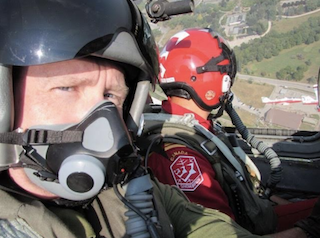A Man on a Mission
Monday, March 5, 2018 /

Combining careers in medicine and the military has allowed Lieutenant Colonel Nathan Nugent to chart his own course and help fellow Canadians. Nathan joined the City of Belleville’s military reserve 25 years ago as an eager 18-year-old and he’s never looked back. “I enjoyed the camaraderie and being outdoors – it was an adventure. I was paid to go out with my friends on training exercises.”
Since then, Nathan has been a nurse in remote First Nations communities, served as the flight surgeon for the Snowbirds Air Demonstration Squadron, and participated in the medical screening of aspiring Canadian astronauts. “People are surprised when I tell them that – from a medical perspective – screening astronauts isn’t that challenging. The applicants are all extremely healthy.”

In 2015, Nathan was promoted to Head of the School of Operational Medicine (SOM) with the Canadian Forces Environmental Medicine Establishment. SOM trains flight surgeons – specialized medical military officers responsible for the health of pilots and air and ground crew on Canadian Air Force bases. Flight surgeons (who are doctors, but not necessarily surgeons) are responsible for preventing and treating health
issues so that aviation personnel can perform at the highest level.
Nathan’s interest in medicine was triggered by a childhood spent struggling with debilitating asthma attacks. “I spent a lot of time in oxygen tents and I missed a lot of school,” he says. Determined to overcome this setback, Nathan became a high school track and field athlete obsessed with fitness and preventative medicine.
When he looked to doctors, however, for wellness strategies to cope with his asthma and sports injuries and to optimize his health and performance, Nathan ran into a brick wall. “The GPs didn’t know why I was there. Their medical model was centred on “health” being simply the absence of disease.” He discovered that nurses were more aware and helpful, prompting him to complete a nursing diploma at Loyalist College and then earn his Bachelor of Science in Nursing at Lakehead.
“Lakehead offered many electives related to First Nations and I was attracted to that more holistic approach to health,” Nathan explains. “I also knew that there was a pressing need for health care in these communities.”
He finished the RN program while working as a nurse at the Pikangikum First Nation on a Health Canada placement. “For a time, it was just myself and one other nurse, even though it was a six-nurse station. Lakehead prepared me for those challenges.”
Wanting to delve deeper into health promotion and illness prevention, Nathan took on a Heart Health Coordinator position at a Belleville health unit. From there he went on to earn a medical doctorate from McMaster University and a specialization in Family Medicine from Queen’s University. During medical school and residency, he had the opportunity to return to Northwestern Ontario for a number of community placements and electives. Through the Canadian Forces, he had the opportunity to obtain a Master of Public Health at the University of West Florida followed by an Aerospace Medicine residency with the U.S. Navy.
Nathan got into the aviation medicine field by chance. “There was an opening at the Cold Lake Air Force Base where Canada trains our F-18 pilots and I jumped at it.” To care for air crew, he first had to become trained as a Flight Surgeon. “If we have a pilot flying an F-18, with health issues – or even effected by something as seemingly benign as dehydration and their concentration and coordination is off – it can really impact the mission. They may be flying with bombs or doing air to air refuelling over the Atlantic Ocean.”
Nathan continues to push his own limits. He likes the idea of going on a UN relief mission to Africa or working in Iraq. When his military career is over, he plans to continue to have an impact on society as a family doctor or as a medical officer of health. “Officers of health are at the forefront of educating the public on health promotion and illness prevention issues, such as strategies to address the opioid crisis. These are the issues that really look at optimizing people’s health and that appeals to me.”

